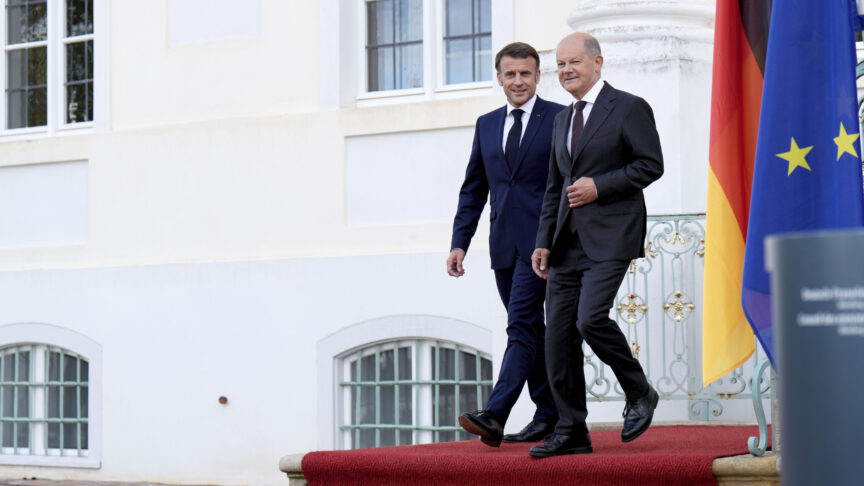Clumsy but useful? The German defence minister’s initiative for northern Syria
The widely dismissed proposal can still serve a valuable purpose if it relaunches a debate on how Europe can act with long-overdue relevance in Syria.
When Annegret Kramp-Karrenbauer (popularly referred to in Germany as “AKK”) put forward a proposal to establish an internationally controlled safe zone in northern Syria last week, the reaction at home and abroad was reserved, if not hostile. Germany’s defence minister and Chancellor Angela Merkel’s successor as chair of the Christian Democratic Union, AKK provided few details on the proposal and neglected to consult with her government’s domestic or foreign partners beforehand. Nonetheless, the thrust of the approach – which involved an increased role for Europe in managing challenges in its immediate neighbourhood – is welcome.
Some analysts suspect that AKK’s initiative was ultimately geared more towards a domestic audience and her own party – which increasingly questions her leadership credentials – than towards the European Union’s Syria policy. This may be partly true. But the initiative can also serve a valuable purpose if it relaunches a debate on how the EU can act with long-overdue relevance in Syria, given the bloc’s increasing divergence with the United States. If Europeans truly believe that a more assertive Berlin is key to an EU that defends its interests and values amid intensifying competition with other great powers, they should use the current moment to take the debate beyond AKK’s proposal itself.
Towards this end, however, German and other European leaders will need to tackle their lack of coordination. German policymakers – including the foreign minister – and their counterparts elsewhere in Europe were surprised by AKK’s initiative. In many respects, this condemned the effort to failure from the outset. Any such initiative also requires close coordination with Germany’s EU partners, especially France – which, in contrast to most European countries, has a strong military presence in the Middle East. As the Bundestag has the final say on any German military operation, the Bundeswehr is highly unlikely to undertake a mission in Syria without a clear United Nations mandate and a viable exit strategy. Only the full support of France and the United Kingdom, two permanent members of the UN Security Council, could provide the plan with a route towards serious consideration. Indeed, Germany should bring the debate to the proper forum, the Security Council, on which it is currently a non-permanent member.
Coordination between EU member states should also extend to greater engagement with Russia and Turkey, both of whose support is required to implement any effective initiative on the ground. But the time for the deployment of European troops in northern Syria has passed: the US spent months hinting that it would withdraw its forces from the area and asking Europe to deploy troops on the ground, before abruptly following through in the face of Turkey’s invasion. The forces of the Syrian regime and Russia quickly filled the void. Accordingly, Turkey did not negotiate a ceasefire and safe zone arrangement with Europe, its NATO allies, or the UN, but the main power on the ground: Russia.
Europeans should use the current moment to take the debate beyond AKK’s proposal itself.
Russia and Turkey are unlikely to support an initiative that might threaten their own interests. However, Europe has no alternative to close coordination with the countries: Turkey’s fellow NATO members need to push it to end its military operation in Syria, which violates international law and displaces civilians. Although Turkey has legitimate security concerns in northern Syria, this is no justification for the mass resettlement of mostly Sunni Syrian refugees there to alter the ethnic composition of the region. Thus, the EU should offer Turkey an increase in economic assistance – not the decrease that it has announced – for the almost four million Syrian refugees who still depend on Turkey as a safe haven. Russia, as another member of the UN Security Council and a power likely able to veto any EU plan, also needs to know what Europe can bring to the table. This kind of approach requires Europe not only to propose military initiatives but also to engage in hard-nosed diplomacy.
To have any chance of success, Germany and other European countries will also need to tie their involvement to a viable political track that provides a realistic path forward. As a constitutional committee is being established under the auspices of the UN and the debate about Syria’s political future is moving forward – to eventually cover the questions of minority rights and arrangements for autonomy – any debate about a UN-mandated international presence should be closely tied to the political road map. Given that it remains unclear how such a presence in Syria would form and would contribute to humanitarian relief, long-term stability, or reconciliation, there is an urgent need for a European debate on these issues.
By recently organising a diplomatic initiative on the Libyan war, Germany demonstrated that it can take the lead on conflict resolution and a mediation process that involves foreign actors. A similar initiative for Syria would be welcome. Instead of focusing on how AKK bypassed the foreign minister, the main parties in the Bundestag, and the rest of the EU, Berlin should now advance new proposals for a more active German and European Syria policy.
The European Council on Foreign Relations does not take collective positions. ECFR publications only represent the views of their individual authors.


